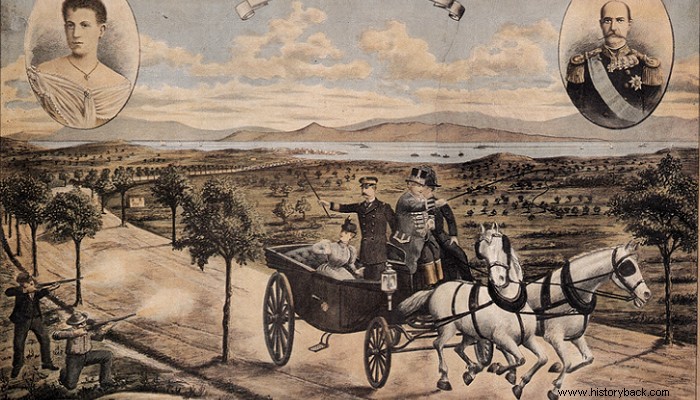
In 1898, Greece was literally "boiling". The war with Turkey had ended, a few months before, with a humiliating defeat. At the same time, Greece had to pay huge war reparations, even though it had already been bankrupt since 1893. Thus, an International Financial Control was imposed on the country.
The atmosphere was particularly heavy for the palace as well, on which many blamed for the defeat. Under these circumstances, on the afternoon of February 14, 1898, George I and his daughter, Princess Maria, were returning to the palace from their walk in Paleo Faliro. Shots were fired near Analatos, in today's Agios Sostis. , by which one of the king's attendants was wounded.
The two perpetrators of the attack disappeared, but were arrested the next day. It was the municipal employee Georgios Karditsis, who had fought in Crete voluntarily and Ioannis Georgiou or Kyriakos from Macedonia . Both did not have a criminal record, nor had they ever concerned the authorities.
The perpetrators claimed that they wanted to kill Georgios because they considered him responsible for the defeat and the national humiliation. However, in a country where conspiracy theories spring up like mushrooms, the rumor soon spread that the attempt was "set up" by the palace itself with the aim of the king regaining lost popular sympathy.
In fact, the newspaper "Kairoi" of Petros Kanellidis openly supported the conspiracy theory, with the result that Kanellidis was arrested for slandering the king. Under these circumstances, the trial of the two perpetrators took place very quickly, on March 19, 1898.
In his apology, Karditsis said:"The press and the entire public opinion knew and said that the king and his ministers were the cause of the shameful war. I decided to avenge the insulted honor of my country and therefore I carried out the act"...
The accused were sentenced to death. The punishment was considered severe. Georgios, however, did not grant a pardon, thus wanting to refute the rumors of a "set up" attempt. The two were executed on April 27 in Nafplion, but again there were rumors that the condemned were not executed but fled abroad.
German involvement?
Another point of view was given by the historian Yiannis Kordatos, who argued that German agents convinced the two perpetrators to attempt the attempt. Kaiser Wilhelm of Germany was a staunch opponent of George despite the fact that his sister Sophia had married the heir to the Greek throne, Constantine.
The Kaiser had earlier, on the occasion of the dispatch of the Greek army to Crete in 1896-97, requested the imposition of a blockade on Greece exclaiming:"This is war, quickly the fleet in front of Piraeus...". We must not forget that even in 1913, when George I was finally assassinated, perhaps the most successful of the kings of the new Greek state, rumors of German involvement circulated again, with the aim of ascending to the throne of Constantine, influenced by his German wife.
